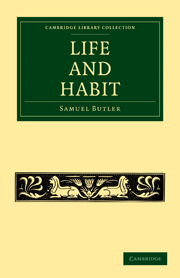Book contents
- Frontmatter
- PREFACE
- Contents
- CHAP. I ON CERTAIN ACQUIRED HABITS
- CHAP. II CONSCIOUS AND UNCONSCIOUS KNOWERS—THE LAW AND GRACE
- CHAP. III APPLICATION OF FOREGOING CHAPTERS TO CERTAIN HABITS ACQUIRED AFTER BIRTH WHICH ARE COMMONLY CONSIDERED INSTINCTIVE
- CHAP. IV APPLICATION OF THE FOREGOING PRINCIPLES TO ACTIONS AND HABITS ACQUIRED BEFORE BIRTH
- CHAP. V PERSONAL IDENTITY
- CHAP. VI PERSONAL IDENTITY—(continued)
- CHAP. VII OUR SUBORDINATE PERSONALITIES
- CHAP. VIII APPLICATION OF THE FOREGOING CHAPTERS — THE ASSIMILATION OF OUTSIDE MATTER
- CHAP. IX ON THE ABEYANCE OF MEMORY
- CHAP. X WHAT WE SHOULD EXPECT TO FIND IF DIFFERENTIATIONS OF STRUCTURE AND INSTINCT ARE MAINLY DUE TO MEMORY
- CHAP. XI INSTINCT AS INHERITED MEMORY
- CHAP. XII INSTINCTS OF NEUTER INSECTS
- CHAP. XIII LAMARCK AND MR. DARWIN
- CHAP. XIV MR. MIVART AND MR. DARWIN
- CHAP. XV CONCLUDING REMARKS
CHAP. II - CONSCIOUS AND UNCONSCIOUS KNOWERS—THE LAW AND GRACE
Published online by Cambridge University Press: 29 August 2010
- Frontmatter
- PREFACE
- Contents
- CHAP. I ON CERTAIN ACQUIRED HABITS
- CHAP. II CONSCIOUS AND UNCONSCIOUS KNOWERS—THE LAW AND GRACE
- CHAP. III APPLICATION OF FOREGOING CHAPTERS TO CERTAIN HABITS ACQUIRED AFTER BIRTH WHICH ARE COMMONLY CONSIDERED INSTINCTIVE
- CHAP. IV APPLICATION OF THE FOREGOING PRINCIPLES TO ACTIONS AND HABITS ACQUIRED BEFORE BIRTH
- CHAP. V PERSONAL IDENTITY
- CHAP. VI PERSONAL IDENTITY—(continued)
- CHAP. VII OUR SUBORDINATE PERSONALITIES
- CHAP. VIII APPLICATION OF THE FOREGOING CHAPTERS — THE ASSIMILATION OF OUTSIDE MATTER
- CHAP. IX ON THE ABEYANCE OF MEMORY
- CHAP. X WHAT WE SHOULD EXPECT TO FIND IF DIFFERENTIATIONS OF STRUCTURE AND INSTINCT ARE MAINLY DUE TO MEMORY
- CHAP. XI INSTINCT AS INHERITED MEMORY
- CHAP. XII INSTINCTS OF NEUTER INSECTS
- CHAP. XIII LAMARCK AND MR. DARWIN
- CHAP. XIV MR. MIVART AND MR. DARWIN
- CHAP. XV CONCLUDING REMARKS
Summary
In this chapter we shall show that the law, which we have observed to hold as to the vanishing tendency of knowledge upon becoming perfect, holds good not only concerning acquired actions or habits of body, but concerning opinions, modes of thought, and mental habits generally, which are no more recognised as soon as firmly fixed, than are the steps with which we go about our daily avocations. I am aware that I may appear in the latter part of the chapter to have wandered somewhat beyond the limits of my subject, but, on the whole, decide upon leaving what I have written, inasmuch as it serves to show how far-reaching is the principle on which I am insisting. Having said so much, I shall during the remainder of the book keep more closely to the point.
Certain it is that we know best what we are least conscious of knowing, or at any rate least able to prove, as, for example, our own existence, or that there is a country England. If any one asks us for proof on matters of this sort, we have none ready, and are justly annoyed at being called to consider what we regard as settled questions. Again, there is hardly anything which so much affects our actions as the centre of the earth (unless, perhaps, it be that still hotter and more unprofitable spot the centre of the universe), for we are incessantly trying to get as near it as circumstances will allow, or to avoid getting nearer than is for the time being convenient.
- Type
- Chapter
- Information
- Life and Habit , pp. 20 - 42Publisher: Cambridge University PressPrint publication year: 2009First published in: 1878



